5 August 2013 Edition
Colluding in state cover-ups
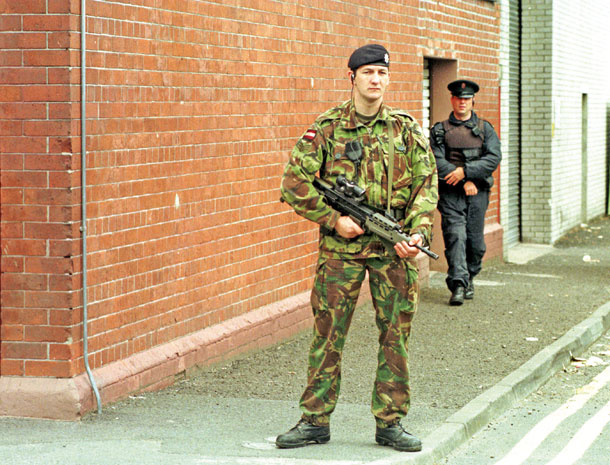
• British soldiers and RUC personnel were not held to account by the Historical Enquiries Team
‘Initiatives were more to do with the management, control and the suppression of truth than of truth recovery’ – Relatives for Justice
HET: Historical Enquiries Team
- Successive British Governments knew it was corrupt
- Successive British Secretaries of State knew it was corrupt
- Successive PSNI Chief Constables knew it was corrupt
- University of Ulster researcher Dr Patricia Lundy – after two years of unprecedented access to the HET – told them it was corrupt
THE ‘revelation’ by a police watchdog investigation that the Historical Enquiries Team – set up in 2005 to re-examine 3,260 killings in the conflict – probed cases involving the British Army with “less rigour” and with casual disregard to normal practices is confirmation by a British state agency of what nationalists have known down the decades since the 1960s.
University of Ulster academic Dr Patricia Lundy had two years’ of unprecedented access to the HET.
Her 2008 report, Truth, Justice and Dealing with the Legacy of the Past in Northern Ireland, also exposed the role of “intelligence gatekeepers”.
She concluded that Special Branch and other intelligence agents were acting as barriers to disclosure, denying access to information to hundreds of families seeking the truth in relation to other conflict-related, state and state-sponsored killings.
The HET rejected Dr Lundy’s findings out of hand.
Speaking at the time, Relatives for Justice spokesperson Mark Thompson called for the HET to be scrapped.
“RFJ has always maintained that the HET’s process is not independent because it is accountable to the PSNI Chief Constable.
“Senior officers running the HET spent several years under both Hugh Orde and John Stevens investigating collusion and the findings of that report never saw the light of day.”
London Metropolitan Police Commissioner Sir John Stevens investigated collusion between the crown forces and loyalist paramilitaries over a number of periods: from 1989, 1993 and 1999, producing reports known as Stevens One, Stevens Two and Stevens Three.
Britain’s ‘top cop’ found that British Military Intelligence in the North of Ireland helped to prolong the conflict.
Stevens said informants and agents “were allowed to operate without effective control and to participate in terrorist crimes”.
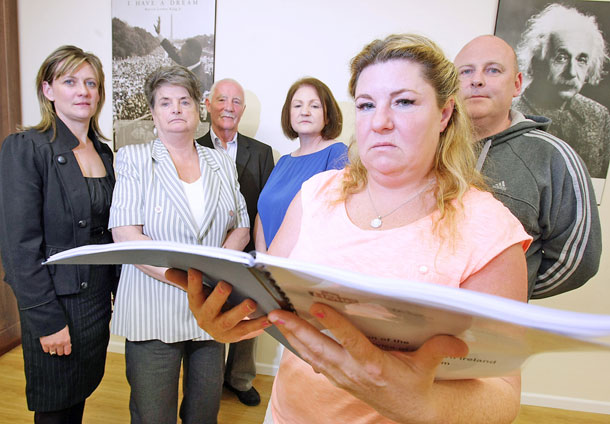
• Bereaved families in the Relatives for Justice office on Glen Road speak to the media following the publication of the HMIC report on the Historical Enquiries Team
Stevens Three found that members of the RUC and British Army colluded with the Ulster Defence Association (UDA) to murder Catholics.
Mark Thompson continued:
“We need a constructive debate in the community about finding a truth recovery process that’s completely independent and in which people can engage with confidence. The HET doesn’t meet those requirements so it needs to go. Don’t re-jig it or try to fix it — just scrap it.”
The Relatives for Justice concluded:
“Previous initiatives were more to do with the management, control and the suppression of truth than of truth recovery.”
Yet the HET carried on with its biased investigations into conflict-related deaths unchallenged and unhindered, effectively perverting the course of justice, as it conducted inquiries into state agency killings less rigorously than other cases.
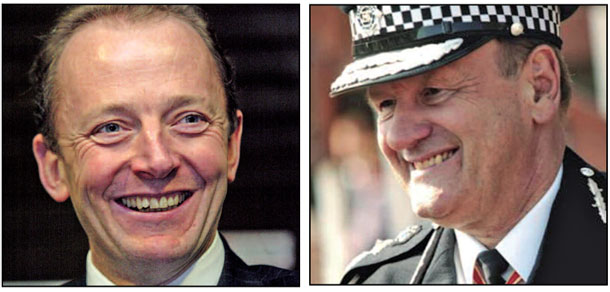
• Former PSNI Chief Constable Hugh Orde and Former Metropolitan Police Commissioner John Stevens
The release on Wednesday 3 July of The Inspection of the Police Service of Northern Ireland Historical Enquiries Team by police watchdog Her Majesty’s Inspectorate of Constabularies (HMIC) finally vindicated her and her research, Dr Lundy said.
She added:
“I think the HET as an organisation itself is irretrievable at this point.”
She thinks it has implications for lots of different cases, not just the British Army cases, because:
“We’ve heard the structural problems: there’s no oversight, there’s no complaints procedure and really it seemed to me that it was a bit of a law unto itself.”
In theory, the HET was under the direct control of and answerable to the PSNI Chief Constable. The HMIC found “the only accountability structure is the reporting line from the Director of the HET to the Chief Constable” but noted “there was no public reporting mechanism and as a result no public scrutiny”.
The lack of consistency within the HET was also criticised by the HMIC. No “standard format for recording policy decisions” was in place.
Individual Senior Investigation Officers (SIOs) “adopted their own approach to the recording of the progress of their enquiries and the decisions taken. As a result, many such decisions are not recorded at all.”
It is in the management of intelligence handled in the main by ex-RUC members and PSNI officers working for HET who manage information from C3, the PSNI’s intelligence branch, that underscores the HET’s reliance on rather than independence from the PSNI. 15 of the 17 HET staff dealing with intelligence were former RUC or PSNI personnel.
It would also seem that the lack of accountability relating to decisions made by individual SIOs allowed for abuses of process that meant “state actors”, British soldiers and RUC personnel, were not held to account by the HET.
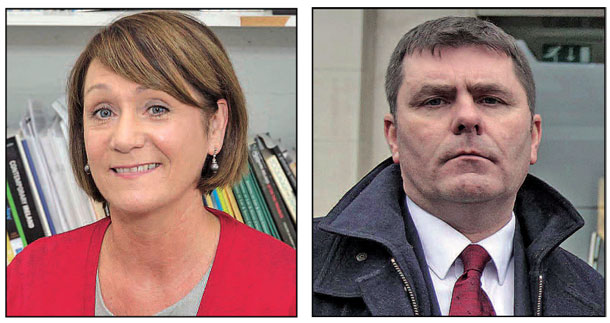
• University of Ulster academic Dr Patricia Lundy and Relatives for Justice spokesperson Mark Thompson
In reality, members of the British Army or RUC were treated as witnesses rather than suspects by HET investigators and given advanced knowledge of the questioning prior to being interviewed. That anyone being interviewed as part of a police investigation into a murder would get such vital advance knowledge is breath-taking.
The HMIC said:
“This approach to state involvement cases is illegal and untenable as it is inconsistent with the UK’s obligations under Article 2 of the European Court of Human Rights that upholds the right to life of citizens.”
Key British Army witnesses – or possible suspects – were interviewed by telephone because they claimed they were too ill to be interviewed in person.
One case related to the case of an 11-year-old boy killed by a British Army rubber bullet.
Dr Lundy was told that when the HET informed a solicitor that a British former soldier was too ill to be questioned. “His ill-health was all too plain to see and to attempt to interview him would have been ludicrous,” the solicitor was told.
HMIC has since found out that the soldier concerned was actually spoken to by the HET by telephone, “in which case it is unclear how the HET’s staff were able to ‘see’ his state of health”.
This also raised the crucial question for the HMIC of how was the HET able to confirm they were talking to the right person?
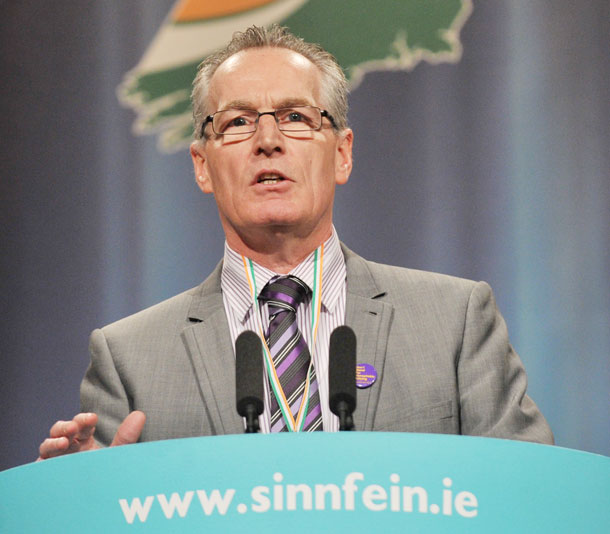
• Sinn Féin MLA Gerry Kelly
THE North’s Policing Board said in a public statement on 4 July that it has no confidence in the Historical Enquiries Team after the damning report by Her Majesty’s Inspectorate of Constabulary.
The HMIC, it said, had uncovered “very serious organisational, governance and oversight issues”
It said the HET was illegally investigating deaths involving British Army soldiers with less rigour than cases with no state involvement.
“It is the view of the board that all military case reviews by the HET are suspended.”
Exactly a year earlier, on 4 July 2012, Sinn Féin MLA Gerry Kelly said the report from the University of Ulster into the HET confirmed what the party had said from the outset about the lack of independence in the HET investigations.
The Sinn Féin Policing spokesperson and member of the Policing Board said:
“The crucial part in this report by Dr Lundy is that she does not believe the HET is independent, that interviews with British soldiers were not impartial, effective or transparent. That the HET is investigating the deaths of people at the hands of the British Army differently from other killings is unacceptable
“Sinn Féin supports people’s right to engage with the HET and accepts that some families have come away from the HET process with a degree of comfort.
“Any deaths during the conflict need to be investigated with the same vigour regardless of who carried out the killing or the standing of the person killed. Sinn Féin is calling for an independent assessment of how HET investigations have been and are being carried out.”
On 4 July 2013, Sinn Féin MLA Pat Sheehan returned to the issue at the meeting of the Policing Board, saying:
“Sinn Féin has always insisted that the HET is not independent. It does not command widespread public confidence and is not compliant with the international human rights obligations which bind the British Government.
“The HMIC report confirms there must be an alternative to the HET; it has acted unlawfully.
“Following the report many people will feel that the HET is irretrievably damaged. Some of those representing families bereaved by state violence have already made that position clear.
“The police cannot investigate the police and to suggest that as a remedy to this scandal is a step backwards and nonsensical. We need to find an effective and credible alternative which is inclusive of all citizens in our society.
“Sinn Féin is advocating that all cases with the HET are suspended. What has been suffered by bereaved families must be openly and urgently investigated, including the questioning of police officers or civilian staff in the HET or PSNI who may have perverted the course of justice. Sinn Féin is now requesting a meeting with the Police Ombudsman to discuss how this investigation can begin.
“The Policing Board has agreed to convene a working group to oversee the outworking of the HMIC report. Sinn Féin will be asking that group to include Professor Patricia Lundy, the Public Prosecutions Service, the Police Ombudsman, the Victims Commissioner, Criminal Justice Inspection and, above all, the human rights community and bereaved families to formulate all the available ways forward.”




